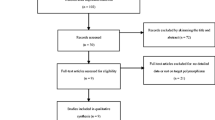Abstract
Cytotoxic T lymphocyte antigen 4 (CTLA-4) gene +49G>A polymorphism was implicated to be associated with risk of malignant bone tumors, but the finding was inconclusive owing to the limited sample of a single study. The objective of the current study was to conduct a pooled analysis of four previously published studies to investigate the association between CTLA-4 +49G>A polymorphism and the risk of malignant bone tumors. Data were extracted, and the pooled odds ratio (OR) with the corresponding 95 % confidence interval (95 % CI) was calculated to assess the association. Those four published studies included a total of 2,165 subjects. The pooled results indicated that CTLA-4 +49G>A polymorphism was significantly associated with risk of malignant bone tumors (AA versus GG: OR = 2.24, 95 % CI 1.67–2.99, P < 0.001; AA/GA versus GG: OR = 1.35, 95 % CI 1.14–1.61, P = 0.001; AA versus GG/GA: OR = 2.00, 95 % CI 1.53–2.62, P < 0.001). Stratified analyses by tumor type showed that CTLA-4 +49G>A polymorphism was associated with risks of both osteosarcoma (AA versus GG: OR = 2.23, 95 % CI 1.45–3.43, P < 0.001; AA/GA versus GG: OR = 1.35, 95 % CI 1.04–1.75, P = 0.024; AA versus GG/GA: OR = 2.00, 95 % CI 1.34–2.98, P = 0.001) and Ewing's sarcoma (AA versus GG: OR = 2.24, 95 % CI 1.51–3.31, P < 0.001; AA/GA versus GG: OR = 1.36, 95 % CI 1.07–1.72, P = 0.011; AA versus GG/GA: OR = 2.01, 95 % CI 1.39–2.89, P < 0.001). Therefore, results from the current pooled analysis suggest that CTLA-4 +49G>A polymorphism is associated with risk of malignant bone tumors, including osteosarcoma and Ewing's sarcoma.



Similar content being viewed by others
References
Balamuth NJ, Womer RB. Ewing's sarcoma. Lancet Oncol. 2010;11:184–92.
Ritter J, Bielack SS. Osteosarcoma. Ann Oncol. 2010;21 Suppl 7:vii320–5.
Yarber JL, Agulnik M. Targeted therapies in bone sarcomas: current approach and future directions. Expert Opin Investig Drugs. 2011;20:973–9.
Toomey EC, Schiffman JD, Lessnick SL. Recent advances in the molecular pathogenesis of Ewing's sarcoma. Oncogene. 2010;29:4504–16.
Schwab JH, Springfield DS, Raskin KA, Mankin HJ, Hornicek FJ. What's new in primary bone tumors. J Bone Joint Surg Am. 2012;94:1913–9.
Chen G, Emens LA. Chemoimmunotherapy: reengineering tumor immunity. Cancer Immunol Immunother. 2013;62:203–16.
Dong LM, Potter JD, White E, Ulrich CM, Cardon LR, Peters U. Genetic susceptibility to cancer: the role of polymorphisms in candidate genes. JAMA. 2008;299:2423–36.
Scalapino KJ, Daikh DI. CTLA-4: a key regulatory point in the control of autoimmune disease. Immunol Rev. 2008;223:143–55.
Yuan J, Ginsberg B, Page D, Li Y, Rasalan T, Gallardo HF, et al. CTLA-4 blockade increases antigen-specific CD8(+) T cells in prevaccinated patients with melanoma: three cases. Cancer Immunol Immunother. 2011;60:1137–46.
Sun T, Hu Z, Shen H, Lin D. Genetic polymorphisms in cytotoxic T-lymphocyte antigen 4 and cancer: the dialectical nature of subtle human immune dysregulation. Cancer Res. 2009;69:6011–4.
Benhatchi K, Jochmanova I, Habalova V, Wagnerova H, Lazurova I. CTLA4 exon1 A49G polymorphism in Slovak patients with rheumatoid arthritis and Hashimoto thyroiditis—results and the review of the literature. Clin Rheumatol. 2011;30:1319–24.
Ghaderi A. CTLA4 gene variants in autoimmunity and cancer: a comparative review. Iran J Immunol. 2011;8:127–49.
Yang M, Sun T, Zhou Y, Wang L, Liu L, Zhang X, et al. The functional cytotoxic T lymphocyte-associated protein 4 49G-to-a genetic variant and risk of pancreatic cancer. Cancer. 2012;118:4681–6.
Liu Y, He Z, Feng D, Shi G, Gao R, Wu X, et al. Cytotoxic T-lymphocyte antigen-4 polymorphisms and susceptibility to osteosarcoma. DNA Cell Biol. 2011;30:1051–5.
Wang W, Wang J, Song H, Liu J, Song B, Cao X. Cytotoxic T-lymphocyte antigen-4 +49G/A polymorphism is associated with increased risk of osteosarcoma. Genet Test Mol Biomarkers. 2011;15:503–6.
Yang S, Wang C, Zhou Y, Sun G, Zhu D, Gao S. Cytotoxic T-lymphocyte antigen-4 polymorphisms and susceptibility to Ewing's sarcoma. Genet Test Mol Biomarkers. 2012;16:1236–40.
Feng D, Yang X, Li S, Liu T, Wu Z, Song Y, et al. Cytotoxic T-lymphocyte antigen-4 genetic variants and risk of Ewing's sarcoma. Genet Test Mol Biomarkers. 2013;17:458–63.
Huang HJ, Angelo LS, Rodon J, Sun M, Kuenkele KP, Parsons HA, et al. R1507, an anti-insulin-like growth factor-1 receptor (IGF-1R) antibody, and EWS/FLI-1 siRNA in Ewing's sarcoma: convergence at the IGF/IGFR/AKt axis. PLoS One. 2011;6:e26060.
Postel-Vinay S, Veron AS, Tirode F, Pierron G, Reynaud S, Kovar H, et al. Common variants near TARDBP and EGR2 are associated with susceptibility to Ewing sarcoma. Nat Genet. 2012;44:323–7.
Mackintosh C, Ordonez JL, Garcia-Dominguez DJ, Sevillano V, Llombart-Bosch A, Szuhai K, et al. 1q gain and CDT2 overexpression underlie an aggressive and highly proliferative form of Ewing sarcoma. Oncogene. 2012;31:1287–98.
Silva DS, Sawitzki FR, De Toni EC, Graebin P, Picanco JB, Abujamra AL, et al. Ewing's sarcoma: analysis of single nucleotide polymorphism in the EWS gene. Gene. 2012;509:263–6.
Attia J, Thakkinstian A, D’Este C. Meta-analyses of molecular association studies: methodologic lessons for genetic epidemiology. J Clin Epidemiol. 2003;56:297–303.
Conflicts of interests
None.
Author information
Authors and Affiliations
Corresponding author
Rights and permissions
About this article
Cite this article
Yu, F., Miao, J. Significant association between cytotoxic T lymphocyte antigen 4 +49G>A polymorphism and risk of malignant bone tumors. Tumor Biol. 34, 3371–3375 (2013). https://doi.org/10.1007/s13277-013-0908-7
Received:
Accepted:
Published:
Issue Date:
DOI: https://doi.org/10.1007/s13277-013-0908-7




